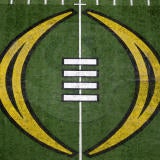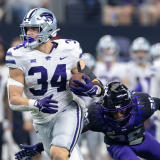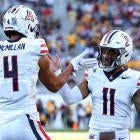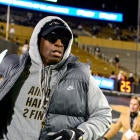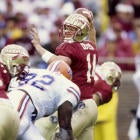
SCOTTSDALE, Ariz. – An expedited NCAA enforcement process addressing name, image and likeness rights abuses is expected to pass as early as Monday, sources tell CBS Sports. How effective it will be -- as the NIL culture chaotically spreads -- is up for debate.
"We know we're going to get lawsuits," Ohio State athletic director Gene Smith told CBS Sports on Friday.
Smith is a member of a little-known NIL working group formed about two months ago to deal with growing questions of illicit activity. Despite the threat of legal liability, Smith said the NCAA and his subcommittee are determined to put up meaningful guardrails around NIL, which in some cases has edged close to pay-for-play.
The working group's recommendations submitted this week primarily deal with booster involvement. Several monied boosters have developed "collectives" establish NIL opportunities for athletes. NCAA stakeholders have long been suspicious of such collectives becoming direct inducements for recruits and transfer candidates.
"What's happening in that space is what we were all fearful of," Smith said. "What's going on -- on campuses [with existing scholarship athletes] -- currently is fine. It's the inducement pieces. We gotta kill that. If we don't kill that now, forget it."
The most likely penalty for boosters, who are not compelled to cooperate in NCAA investigations, is the threat of disassociation from a school. A disassociation means a subject cannot interact with the university in any way.
Former Trojans star Reggie Bush was famously disassociated from USC for 10 years after the NCAA handed down its penalties to him in 2010.
If boosters are found to have collaborated with a program to use NIL benefits as an incentive to lure prospects to the school, the penalties could be severe, Smith said. Options include cutting scholarships, instituting recruiting restrictions and hitting programs and perhaps coaches with lack of institutional control penalties. Those are punishments associated with Level I violations.
"The booster [penalty] is disassociation, primarily," Smith said, "but the schools, if they're culpable ,that's when you can go deep."
The NCAA defines boosters as "representatives of a school's athletic interests." That definition extends to supporters who have made contributions to a school's athletic department, arranged for employment of athletes and/or assisted in providing benefits to athletes or their families.
Once a person is designated as such a representative, they "retain that identity forever," according to the NCAA. In the past, the NCAA has used a broad interpretation of that definition to penalize schools.
Smith said the NCAA is fully invested in the crackdown. The working group's recommendations have passed through the NCAA Transformation Committee and will be taken up next week by NCAA Board of Directors.
Smith has spoken with both NCAA president Mark Emmert and enforcement chief John Duncan.
The expedited process was created with the assistance of NCAA lawyers who helped draw up the guidelines. The NCAA is essentially enforcing rules already on the books that were ignored last year when NIL was initially implemented.
"It would be easy to say, 'I told you so,' but I'm not going to do that," said exiting Big 12 commissioner Bob Bowlbsy, a member of the original working group that issued guardrails last summer.
How soon investigations will be launched and penalties will be handed out remains to be seen. On the short side, NCAA investigations can last less than a year. There are many examples of cases, though, having dragged on for years.
That won't be the case with this new initiative.
"We can't go through our normal process here [such as], 'Give us 90 days to respond,'" Smith said. "We'll be here in 2023. The membership needs responses now."
The original NIL recommendations last summer weren't adopted amid concerns about legal liability. That liability is now more defined as some players are using powerful NFL agents as their NIL marketing agents.
"By preventing boosters/collectives from being involved, the NCAA is acting to reduce compensation earned by athletics," said Mit Winter, a Kansas City-based attorney who deals in NCAA matters. "There would have to get an athlete as a plaintiff for that one."









